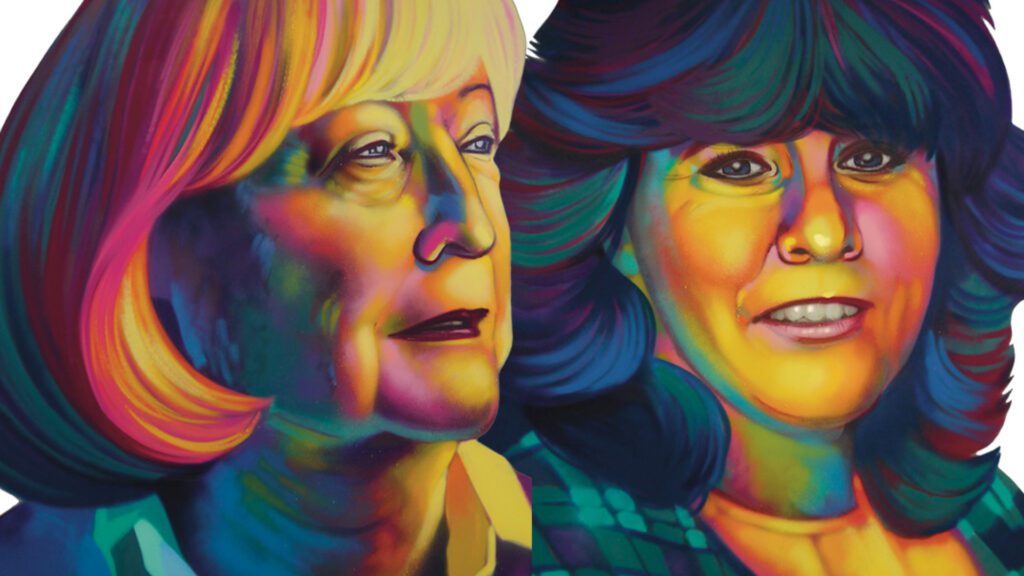
In the buildup to the 25th anniversary of the Good Friday Agreement in 2023, Herstory partnered with the National Museums NI and Department of Foreign Affairs to create the Peace Heroines education programme, featuring a touring exhibition with stunning new portraits of the peace heroines by the artist FRIZ, and youth workshops exploring power.
The Peace Heroines exhibition has been blazing a trail across Northern Ireland and internationally since it launched at the Northern Ireland Assembly in Stormont in September 2022, touring to the Glencree Centre for Peace & Reconciliation, Derry Tower Museum, County Museum Dundalk, Embassy of Ireland in the UK, Áras an Uachtaráin, Leinster House, the US Congress in Washington DC, United Nations in New York, Queen’s Agreement 25 conference and Enniskillen Castle.

Since the 19th century, women in Northern Ireland have been building bridges by setting aside religious and political affiliations to work together to assert their civil rights and challenge laws that restricted their freedoms; issues regarding women’s education, married women’s property rights and voting rights. From local to national, this cooperative characteristic of the women’s movements continued into the 20th century with suffragism, trade unionism and eventually, the peace movement of the 1960s on.
Women from all walks of life played a pivotal role in the Northern Ireland peace process and continue cross-community dialogue and reconciliation projects today. Ordinary women with extraordinary courage, they faced daily threats to their lives and the lives of their families.
Many overcame struggles with poverty, poor education, and personal tragedy to work together for peace. They did everything from supporting victims of sectarian violence to lobbying politicians, founding integrated education, starting cross-community projects, organising mass peace marches, and inspiring women to participate in political and public life.
From grassroots to government levels, the exhibition captures a diversity of voices and perspectives, featuring 30 women’s stories including Monica McWilliams and Pearl Sagar, Linda Ervine MBE, Pat Hume, Baroness May Blood MBE, Hillary Clinton and Saidie Patterson. Powerful partnerships are explored such as Peace People, NI Women’s Coalition, Women Together, and Derry Peace Women.
To understand the pivotal role of the Peace Heroines we must first understand different expressions of power and how the women challenged domination systems that create inequality, discrimination and conflict. Instead these visionary activists offered new power-sharing approaches and partnership initiatives. They put people, not territories, at the heart of their peace-building strategies. They understood that peace can only be possible from a strong foundation of equality, reconciliation and partnership.
Many of the NI peace heroines continue their activism today, not just in Northern Ireland but around the world, bringing their wisdom and experience to women and peace movements in Bosnia, Georgia, Afghanistan, Sudan, Cyprus, Congo, Columbia, Palestine, the Philippines, Guatemala, Kenya, United Nations and more.
FRIZ is a Northern Ireland-based artist who works in both traditional and digital mediums. Her work explores history, myths and the folklore that shapes the cultural identity of a place. It is a study in who we are; where we come from and our connection to the natural world around us.
“To create this body of work I started by learning about the women and their fantastic achievements and contributions to peace in Northern Ireland. In exploring how to approach the portraits one thing that struck me was how much of the personality of each individual shone through their photos. To this end I wanted the final pieces to be colourful and unignorable, much like the women themselves.”
Pat Hume
As leader of the Social Democratic and Labour Party, John Hume was a major, visible driving-force behind the peace process however he couldn’t have done it without his wife Pat, ‘his trusted advisor [and] political antenna.’ Pat worked as a teacher, supporting the family financially in the early years of John’s political career. When he was elected a Member of the European Parliament in 1979 she ran his office full-time. As a constituency office manager, she took on a more visible and politically active role within her community, helping many who were affected by the conflict, and offering advice on housing, security, and education issues. John and Pat’s joint actions were critical in the realisation of major political developments in Northern Ireland that led to peace.
Discover more here.
Bronagh Hinds
Throughout her time at Queen’s University, Bronagh Hinds was an advocate for equality. In 1975, she co-founded the Northern Ireland Women’s Rights Movement, and later, the Northern Ireland Women’s European Platform. Ahead of the peace talks in 1996, she co-founded the Northern Ireland Women’s Coalition. As chief strategist, she helped to manage its election to the peace talks and later acted as ‘senior advisor and negotiator of the Good Friday Agreement.’
Discover more here.
Eileen Weir
At the age of 16 Eileen Weir joined the UDA but as soon as she became a member of her trade union more than 30 years ago, she saw that injustice was rife across religious and social divides, not just in her own community. Since then, Eileen has worked tirelessly for women’s and community rights both through her trade union and later through her role as a community relations worker at the Shankill Women’s Centre in Belfast, bridging religious and social divides.
Discover more here.
Susan McCrory
Current Manager of the Falls Women’s Centre, Susan McCrory has over the past three decades been instrumental in ‘designing, delivering, and creating’ opportunities for women from both the Catholic/Nationalist and Protestant/Unionist communities to come together, to explore the past and build a shared future.
Discover more here.
Saidie Patterson
Saidie’s life changed forever in 1918 when her mother died during childbirth. That night the 13-year-old Saidie became an adult. Following years as a trailblazing trade unionist, she became a legendary peace activist, leading Women Together as chairman, and then lifetime Vice-President. As a key member of the Girls Club Union for over 50 years, Saidie brought girls from the Shankill and Falls together for a range of activities. She was honoured with five international peace awards including the first World Methodist Peace Award.
Discover more here.
Monica McWilliams
Monica McWilliams sat as the Chair of Gingerbread’s Social Policy Committee throughout the 1980s and often spoke on behalf of the Northern Ireland Poverty Lobby on poor housing, unemployment, and dependence on social welfare. In 1996 she co-founded the Northern Ireland Women’s Coalition and was one of just two women at the table of the All-Party talks discussing the future of Northern Ireland. Monica became Professor of Women’s Studies and later Chief Commissioner at the Human Rights Commission where she drafted the advice on a Bill of Rights for Northern Ireland as required by the Good Friday Agreement.
Discover more here.
Pearl Sagar
In the lead up to the All-Party Talks in 1996, Pearl Sagar’s name was put forward to be one of the two women at the table, representing the Northern Ireland Women’s Coalition alongside Monica McWilliams. A social worker from the Protestant community, she was seen as a ‘streetfighter’ and someone who would take ‘no nonsense.’ She and Monica faced continuous sexism but despite this, they and the NIWC secured important aspects that were core to the success of the Good Friday Agreement.
Discover more here.
Anne Carr
In the 1980s, Anne Carr co-founded All Children’s Integrated Primary School in Newcastle, Co. Down. In 1990, she returned to Belfast where she continued her peace advocacy as Coordinator of Women Together, working with women across the divides, co-developing Talking and Listening Circles. Around the time of the Agreement, she realised that important conversations were happening behind closed doors and that the voices of ordinary people were not being heard. To address this, thirty people from diverse backgrounds founded Community Dialogue ‘to help transform understanding and build trust amongst people who often hold opposing political, social and religious views.’
Discover more here.
Baroness May Blood
After leaving school at 14 to enter the mill, May joined the Transport and General Workers Union where she learned vital advocacy skills as shop steward. In the 1990s she was involved with the Early Years Project and helped to establish three community centres in the Shankill area to help 1,300+ families. In 1995, she was awarded an MBE by the Queen for her work in labour relations, later becoming the first woman in Northern Ireland to be given a life peerage. As campaign manager of the Northern Ireland Women’s Coalition, she took every opportunity to get in front of the camera to plead their case. May later became a volunteer fundraiser for the Integrated Education Fund and has since raised millions of pounds for the cause.
Discover more here.

The Linen Hall (Belfast Library And Society For Promoting Knowledge) is registered with the Charity Commission for Northern Ireland NIC 104 564.